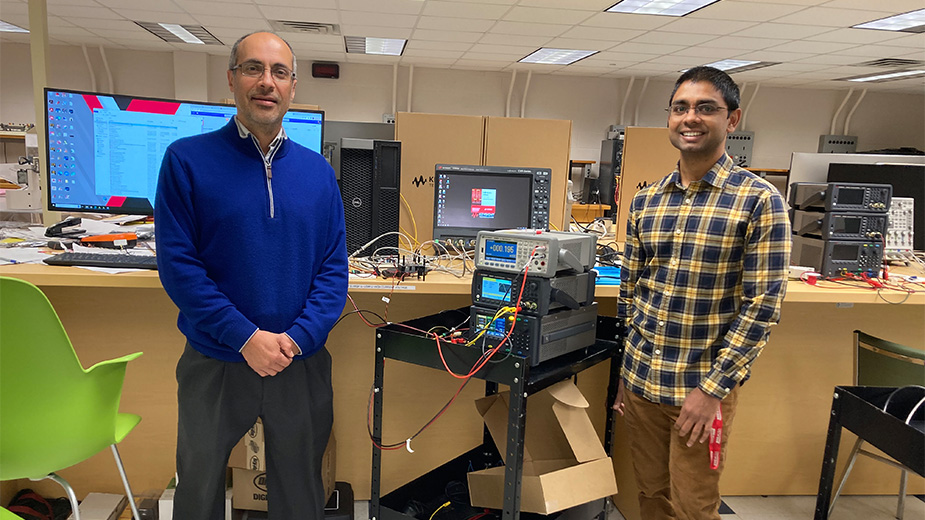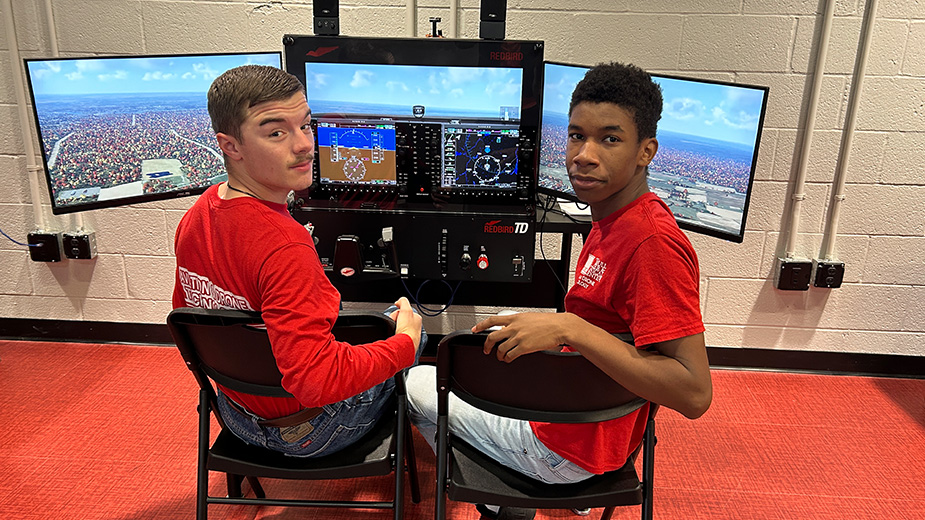YSU Team Focuses on ‘Transformative’ Technology
YOUNGSTOWN, Ohio – A team of Youngstown State University researchers is working on microelectronics technology for the U.S. Department of Defense.
Pedro Cortes, professor of civil, environmental and chemical engineering; Vamsi Borra, assistant professor of electrical and computer engineering; and Frank Li, chairman of the engineering department and professor of electrical engineering, form the YSU contingent of the Midwest Microelectronics Consortium Hub. It’s funded by the CHIPS and Science Act of 2022.
That hub, which also includes other universities – Ohio State University, Purdue University and the University of Michigan among them – and other organizations, was awarded a $23.4 million grant from the U.S. Department of Defense.
It’s one of eight regional hubs across the country that focus on multiple technology areas.
“Anything that is related in nanolevel and microlevel, you can think of as microelectronics,” Borra said.
The YSU group is focusing on 5G/6G electronic warfare technology.
Cortes said the technology must be able to withstand high temperatures, and the YSU team wants to make complex, unique structures.
“The way to do that is with 3D printing,” he said. “I want to believe that we still have the flag that is additive manufacturing. America Makes is just a five minute walk from here. So we’re trying to bring that flag that is microelectronics with YSU, like the University of Akron and polymers.”
Microelectronics allows the creation of complex, convoluted, unique, very small 5G/6G technology. The YSU professors are focusing on antennas that must withstand high temperatures.
“That pretty much is going to be targeting the Department of Defense, especially the Air Force,” Cortes said.
Those antennas will enable faster and more efficient communication, he explained.
“But when you’re around high temperature conditions, the actual material of the common antenna is not going to resist [the temperature],” Cortes said. “You need to have new materials that actually can support those high temperature conditions.”
YSU already has high temperature sensors enabling the professors to use 3D printing.
“It’s still the same concept,” Cortes said. “It’s just under high temperatures.”
The Midwest Semiconductor network, which includes many universities along with YSU, formed after approval last year of the federal CHIPS and Science Act.
The act aims to bolster semiconductor research and boost manufacturing in the United States, with the federal government offering billions in grants and loans.
The network formed to enable those universities and other entities to pursue some of that funding as a group, improving the likelihood of money being awarded, Borra said.
“I think what they’re trying to do with the CHIPS Act is be all inclusive,” Cortes said. “They are reaching out to all universities that can be part of this effort.”
He notes that there’s been a big change at YSU over the past several years, enabling the university to participate in higher-level research.
A lot of that stems from what’s happening in the region with other universities like Case Western Reserve University in Cleveland and Carnegie Mellon University in Pittsburgh, Cortes said.
The advent of an additive manufacturing research and education center in the city also plays a role.
“I believe having America Makes here in town brought a big boom,” he said.
“It was a game changer,” Borra added.
It’s helped to raise the profile of what’s happening at YSU.
“I think it gives way more opportunities for students, more opportunities to be hands-on and be part of something that is really big,” Cortes said.
It also makes YSU an appealing option for people in the community to send their children for an education.
News of what’s happening at YSU – like research grants and collaborations with other institutions – is spreading around the country and beyond.
When Borra first came to Youngstown from India as a student in 2011, he was struck by the differences between expensive houses in one part of the community and dilapidated houses in another. He learned from a friend about the collapse of the local steel industry and its effect on the area.
Borra sees microelectronics and 3D manufacturing as being a new boon for the Mahoning Valley.
“I think down the road, maybe in three or four generations, people will think of it as a manufacturing hub,” he said.
Cortes said the work allows him to be part of something important while also doing what he loves.
“I have always wanted to be part of something transformative, something that’s the solution and the answer for industry problems,” he said. “And I love research, to be honest with you. I like to be really embedded into that. When you see these opportunities – and especially with additive manufacturing, which is my passion – I love it. Why not be part of that answer? And with that, you can bring colleagues and bring students and bring them on board and enjoy that.”
Pictured at top: Pedro Cortes, Youngstown State University professor of civil, environmental and chemical engineering, and Vamsi Borra, assistant professor of electrical and computer engineering, stand in a lab inside Moser Hall on the YSU campus.
Copyright 2024 The Business Journal, Youngstown, Ohio.



